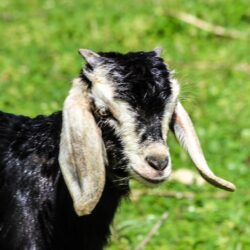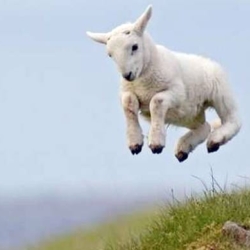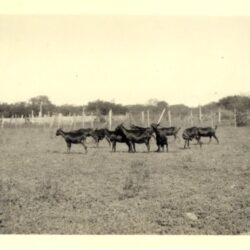Ḥad Gadya has a place in Seder tables throughout the Jewish world, and in many communities it was read in translation. This translation is in Judezmo, also known as Judeo-Spanish or Ladino. There are a great many Judezmo versions of Ḥad Gadya, corresponding to the great variety of dialects spoken throughout the Sephardi cultural area. This text is expanded version of a version described as “a standard” by the University of Washington.[1] Devin Naar, “Had Gadya in Ladino: A Sephardic Passover Tradition?” 18 April 2016, Stroum Center for Jewish Studies, University of Washington –accessed 15 April 2019. It has also been reset in a variation of traditional Hebrew orthography alongside the Aki Yerushalayim Latin type used in scholarly analysis. This text, or a variation of it, could be added to any Passover Seder alongside the traditionally Aramaic text. One key note for those unfamiliar with Aki Yerushalayim orthography is that the letter H is pronounced as a hard sound, like modern Hebrew ח or כ. Other than that it’s very easy to read for English speakers.
| Source (Aramaic) | Translation (Judezmo/Ladino) | Romanization (Judezmo/Ladino) | Translation (English) |
|---|---|---|---|
חַד גַּדְיָא, דְּזַבִּן אַבָּא בִּתְרֵי זוּזֵי. |
און קאבﬞריטיקו קי לו מירקו מי פאדרי פור דוס לבﬞנים, פור דוס לבﬞנים. |
Un kavritiko, ke lo merko mi padre por dos levanim, por dos levanim. |
One little goat that my father bought for two zuzim, for two zuzim. |
וְאָתָא שֻׁנְרָא וְאָכְלָה לְגַדְיָא, דְּזַבִּן אַבָּא בִּתְרֵי זוּזֵי. |
אי בﬞינו איל גאטו אי סי קומייו איל קאבﬞריטיקו, קי לו מירקו מי פאדרי פור דוס לבﬞנים, פור דוס לבﬞנים. |
I vino el gato i se komio el kavritiko, ke lo merko mi padre, por dos levanim, por dos levanim. |
A cat came and ate the goat that my father bought for two zuzim, for two zuzim. |
וְאָתָא כַּלְבָּא וְנָשַׁךְ לְשֻׁנְרָא, דְּאָכְלָה לְגַדְיָא, דְּזַבִּן אַבָּא בִּתְרֵי זוּזֵי. |
אי בﬞינו איל פירו אי מודרייו איל גאטו, קי סי קומייו איל קאבﬞריטיקו, קי לו מירקו מי פאדרי פור דוס לבﬞנים, פור דוס לבﬞנים. |
I vino el perro i modryo el gato, ke se komio el kavritiko, ke lo merko mi padre, por dos levanim, por dos levanim. |
A dog came and bit the cat that ate the goat that my father bought for two zuzim, for two zuzim. |
וְאָתָא חֻטְרָא וְהִכָּה לְכַלְבָּא, דְּנָשַׁךְ לְשֻׁנְרָא, דְּאָכְלָה לְגַדְיָא, דְּזַבִּן אַבָּא בִּתְרֵי זוּזֵי. |
אי בﬞינו איל פאלו אי אחארבﬞו איל פירו, קי מודרייו איל גאטו, קי סי קומייו איל קאבﬞריטיקו, קי לו מירקו מי פאדרי פור דוס לבﬞנים, פור דוס לבﬞנים. |
I vino el palo i aharvo el perro, ke modryo el gato, ke se komio el kavritiko, ke lo merko mi padre, por dos levanim, por dos levanim. |
A stick came and hit the dog that bit the cat that ate the goat that my father bought for two zuzim, for two zuzim. |
וְאָתָא נוּרָא וְשָׂרַף לְחֻטְרָא, דְּהִכָּה לְכַלְבָּא, דְּנָשַׁךְ לְשֻׁנְרָא, דְּאָכְלָה לְגַדְיָא, דְּזַבִּן אַבָּא בִּתְרֵי זוּזֵי. |
אי בﬞינו איל פﬞואיגו אי קימו איל פאלו, קי אחארבﬞו איל פירו, קי מודרייו איל גאטו, קי סי קומייו איל קאבﬞריטיקו, קי לו מירקו מי פאדרי פור דוס לבﬞנים, פור דוס לבﬞנים. |
I vino el fuego i kemo el palo, ke aharvo el perro, ke modryo el gato, ke se komio el kavritiko, ke lo merko mi padre, por dos levanim, por dos levanim. |
A fire came and burned the stick that hit the dog that bit the cat that ate the goat that my father bought for two zuzim, for two zuzim. |
וְאָתָא מַיָּא וְכָבָה לְנוּרָא, דְּשָׂרַף לְחֻטְרָא, דְּהִכָּה לְכַלְבָּא, דְּנָשַׁךְ לְשֻׁנְרָא, דְּאָכְלָה לְגַדְיָא, דְּזַבִּן אַבָּא בִּתְרֵי זוּזֵי. |
אי בﬞינו לה אגואה אי אמאטו איל פﬞואיגו, קי קימו איל פאלו, קי אחארבﬞו איל פירו, קי מודרייו איל גאטו, קי סי קומייו איל קאבﬞריטיקו, קי לו מירקו מי פאדרי פור דוס לבﬞנים, פור דוס לבﬞנים. |
I vino la agua i amato el fuego, ke kemo el palo, ke aharvo el perro, ke modryo el gato, ke se komio el kavritiko, ke lo merko mi padre, por dos levanim, por dos levanim. |
Water came and put out the fire that burned the stick that hit the dog that bit the cat that ate the goat that my father bought for two zuzim, for two zuzim. |
וְאָתָא תּוֹרָא וְשָׁתָא לְמַיָּא, דְּכָבָה לְנוּרָא, דְּשָׂרַף לְחֻטְרָא, דְּהִכָּה לְכַלְבָּא, דְּנָשַׁךְ לְשֻׁנְרָא, דְּאָכְלָה לְגַדְיָא, דְּזַבִּן אַבָּא בִּתְרֵי זוּזֵי. |
אי בﬞינו איל בואיי אי סי ביבﬞייו לה אגואה, קי אמאטו איל פﬞואיגו, קי קימו איל פאלו, קי אחארבﬞו איל פירו, קי מודרייו איל גאטו, קי סי קומייו איל קאבﬞריטיקו, קי לו מירקו מי פאדרי פור דוס לבﬞנים, פור דוס לבﬞנים. |
I vino el buey i se bevyo la agua, ke amato el fuego, ke kemo el palo, ke aharvo el perro, ke modryo el gato, ke se komio el kavritiko, ke lo merko mi padre, por dos levanim, por dos levanim. |
An ox came and drank the water that put out the fire that burned the stick that hit the dog that bit the cat that ate the goat that my father bought for two zuzim, for two zuzim. |
וְאָתָא הַשּׁוֹחֵט וְשָׁחַט לְתוֹרָא, דְּשָׁתָא לְמַיָּא, דְּכָבָה לְנוּרָא, דְּשָׂרַף לְחֻטְרָא, דְּהִכָּה לְכַלְבָּא, דְּנָשַׁךְ לְשֻׁנְרָא, דְּאָכְלָה לְגַדְיָא, דְּזַבִּן אַבָּא בִּתְרֵי זוּזֵי. |
אי בﬞינו איל שוחט אי דיגוייו אל בואיי, קי סי ביבﬞייו לה אגואה, קי אמאטו איל פﬞואיגו, קי קימו איל פאלו, קי אחארבﬞו איל פירו, קי מודרייו איל גאטו, קי סי קומייו איל קאבﬞריטיקו, קי לו מירקו מי פאדרי פור דוס לבﬞנים, פור דוס לבﬞנים. |
I vino el shohet i degoyo al buey, ke se bevyo la agua, ke amato el fuego, ke kemo el palo, ke aharvo el perro, ke modryo el gato, ke se komio el kavritiko, ke lo merko mi padre, por dos levanim, por dos levanim. |
A butcher came and slaughtered the ox that drank the water that put out the fire that burned the stick that hit the dog that bit the cat that ate the goat that my father bought for two zuzim, for two zuzim. |
וְאָתָא מַלְאַךְ־הַמָּ֫וֶת וְשָׁחַט לְשׁוֹחֵט, דְּשָׁחַט לְתוֹרָא, דְּשָׁתָא לְמַיָּא, דְּכָבָה לְנוּרָא, דְּשָׂרַף לְחֻטְרָא, דְּהִכָּה לְכַלְבָּא, דְּנָשַׁךְ לְשֻׁנְרָא, דְּאָכְלָה לְגַדְיָא, דְּזַבִּן אַבָּא בִּתְרֵי זוּזֵי. |
אי בﬞינו איל מלאך המוות אי דיגוייו אל שוחט, קי דיגוייו אל בואיי, קי סי ביבﬞייו לה אגואה, קי אמאטו איל פﬞואיגו, קי קימו איל פאלו, קי אחארבﬞו איל פירו, קי מודרייו איל גאטו, קי סי קומייו איל קאבﬞריטיקו, קי לו מירקו מי פאדרי פור דוס לבﬞנים, פור דוס לבﬞנים. |
I vino el malah amavet i degoyo al shohet, ke degoyo al buey, ke se bevyo la agua, ke amato el fuego, ke kemo el palo, ke aharvo el perro, ke modryo el gato, ke se komio el kavritiko, ke lo merko mi padre, por dos levanim, por dos levanim. |
The Angel of Death came and slaughtered the shoḥet who slaughtered the ox that drank the water that put out the fire that burned the stick that hit the dog that bit the cat that ate the goat that my father bought for two zuzim, for two zuzim. |
וְאָתָא הַקָּדוֹשׁ־בָּרוּךְ־הוּא וְשָׁחַט לְמַלְאַךְ־הַמָּ֫וֶת דְּשָׁחַט לְשׁוֹחֵט, דְּשָׁחַט לְתוֹרָא, דְּשָׁתָא לְמַיָּא, דְּכָבָה לְנוּרָא, דְּשָׂרַף לְחֻטְרָא, דְּהִכָּה לְכַלְבָּא, דְּנָשַׁךְ לְשֻׁנְרָא, דְּאָכְלָה לְגַדְיָא, דְּזַבִּן אַבָּא בִּתְרֵי זוּזֵי. |
אי בﬞינו איל סאנטו בינדיגﬞו אל אי דיגוייו אל מלאך המוות, קי דיגוייו אל שוחט, קי דיגוייו אל בואיי, קי סי ביבﬞייו לה אגואה, קי אמאטו איל פﬞואיגו, קי קימו איל פאלו, קי אחארבﬞו איל פירו, קי מודרייו איל גאטו, קי סי קומייו איל קאבﬞריטיקו, קי לו מירקו מי פאדרי פור דוס לבﬞנים, פור דוס לבﬞנים. |
I vino el Santo Bendicho El i degoyo al malah amavet, ke degoyo al shohet, ke degoyo al buey, ke se bevyo la agua, ke amato el fuego, ke kemo el palo, ke aharvo el perro, ke modryo el gato, ke se komio el kavritiko, ke lo merko mi padre por dos levanim, por dos levanim. |
Then the blessed Holy One came and slaughtered the Angel of Death who slaughtered the shoḥet who slaughtered the ox that drank the water that put out the fire that burned the stick that hit the dog that bit the cat that ate the goat that my father bought for two zuzim, for two zuzim. |
The earliest known appearance of “Ḥad Gadya,” by an unknown author, can be found in the Prague Haggadah (1526). The text of the poem is in a form of playful Aramaic and it is accompanied by the lyrics in medieval Yiddish.[2] The Jewish Encyclopedia (1906, NY) vol. 8 page 190 s.v. “Had Gadya” calls it German. It is unclear which, if either, came first — the Yiddish or the Aramaic. The Aramaic above below follows the text as it appears in the Prague Haggadah (1526). The Aramaic has been vocalized according to the Prague Haggadah (1590). Besides the transcription of the Aramaic with its vocalization, I have also added a translation sourced from Eve Levavi Feinstein’s Passover Haggadah translation. –Aharon N. Varady
Notes

“חַד גַּדְיָא | Un Kavritiko (און קאבﬞריטיקו) — a Judezmo (Ladino) translation of Ḥad Gadya” is shared through the Open Siddur Project with a Creative Commons Attribution-ShareAlike 4.0 International copyleft license.










Leave a Reply